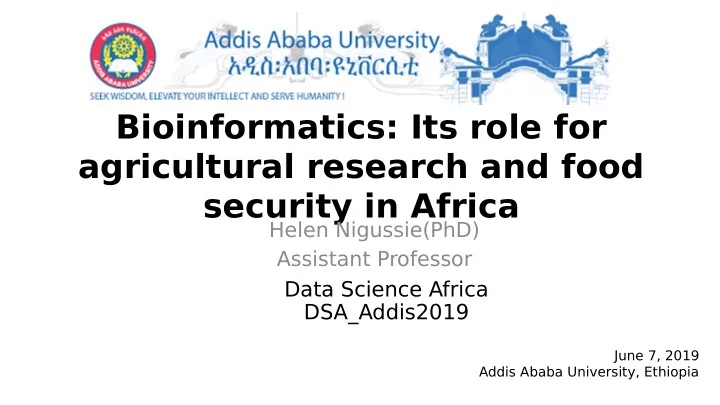

Bioinformatics: Its role for agricultural research and food security in Africa Helen Nigussie(PhD) Assistant Professor Data Science Africa DSA_Addis2019 June 7, 2019 Addis Ababa University, Ethiopia
Who am I Who am I ? ?
What is Bioinformatics? • Bioinformatics is an interdisciplinary fjeld that develops and improves methods for storing, retrieving, organising and analysing biological data. • It also involves the integration of computers, software tools, and databases in an efgort to address biological questions.
What is Bioinformatics?....... • It has come out as a tool to smoothing the ways for biological discoveries. • It has aided in genome sequencing, and has shown its success in locating the genes, in phylogenetic comparison and in the detection of transcription factor binding sites of the genes.
What is Bioinformatics? Increasing interest in genomics research Rapid ground breaking progress of sequencing technology generate big data set Cost-efgective that nowadays it is common for any experimental lab to use sequencing methods to study genome of interest.
How do we use Bioinformatics? • Store/retrieve biological information (databases) e.g NCBI, Emble …….. • Retrieve/compare gene sequences • Predict function of unknown genes/proteins • Search for previously known functions of a gene • Compare data with other researchers • Compile/distribute data for other researchers
How Bioinformatics….. • Bioinformatics deals with any type of data that is of interest to biologists DNA and protein sequences Gene expression (microarray ) Raw data collected from fjel d or laboratory experiment Images, virtual models, Soft ware Articles from literature and d atabases of citations
Why bioinformatics in Agriculture? • Increasing population, urbanization and expected increasing income in Africa lead to strong demand for protein source foods • Food insecurity and malnutrition • Agricultural productivity is
• T o supply nutritional food to continuous increasing world population while considering three important limitations:- • less plow lands, • depletion of energy resources and • unpredictable climate change. • we need to enlarge the pace of research so we can be capable to provide enough food for future generations.
Why Bioinformatics?........ Agenda 2063 ASPIRATION 1 • A prosperous Africa based on inclusive growth and sustainable development Modern agriculture for increased production, productivity and value addition contributes to farmer and national prosperity and Africa’s collective food security.
Signifjcance of Bioinformatics in Agriculture Crop • Molecular breeding Insect Resistance Poorer soils and Drought Resistant Improve productivity and nutritional Quality
Signifjcance…. Livestock Reference genome Improve productivity • Improve the effjciency and well-being of farm animals • and the quality of their useful products Promote effjcient animal health program • vaccine development • diagnosis
Opportunities and Challenges in Africa Opportunity Challenges A number of repositories for Limited access for big data curation and analysis computational facility (HPC, data storage and power and internet) in Africa. Growing number of studies on agricultural genomics since from 2014 to 2018 (PubMed). Shortage of trained bioinformaticians The same trend in Africa following the accessibility and Limited Bioinformatics program afgordability of NGS technology in the educations systems.
New initiatives in Agricultural Bioinformatics Bioinformatics Community of Practice (Bix CoP) Jointly initiated a the John Innes Centre, Earlham Institute and the BecA-ILRI hub, Kenya, Designed to build a strong self-sustaining network of bioinformaticians in Africa with expertise in data analysis for agricultural biosciences Implemented to be completed in three phases that include: the Build phase (April to October 2018), the Empower phase (October and November 2018) and the Amplify phase (2019).
Big data – Data analysis skills = Data Overload
The Programme Empo Ampl Build wer ify Data carpentry, Linux, python R programming NGS, mapping, sequence databases Train-the-trainer Two Regional RNA-Seq and Variant Calling Workshops Soft-skill training GBS, GWAS, Genomic Selection Phylogenetics and Metagenomics Pipelines (Galaxy, Docker, etc)
The Fellows and Partners Partners Ermias Hassan Helen Assefa Ali Aychegrew Bernice Mary Waweru Maranga Isaac Edwin Davies Henry Njaci Murungi Kaimenyi Osaiyuwu Ahadi Bwihangane Pius Abubakaer Muggaga Muwonge Mukani Moyo Okoba Beatus Lyimo
Final projects of BixCoP_2019 Objectives • T o develop a web-based visualization tool for livestock microbiome dataset. • Enhance communication between National Agricultural Research Systems (NARs) and farmers in relation to varieties and crop management • T o Generate a draft whole genome assembly of African Yam Bean.
THANK Y THANK YOU OU
Recommend
More recommend